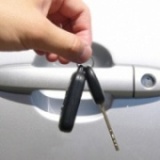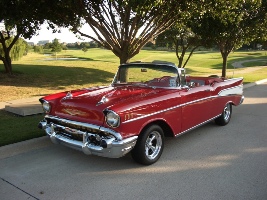If GrownUps might be able to help you find a used (or new) car, please click here.
There are a few major items to check out when buying any used car from private sellers and they are listed below. Follow these guidelines BEFORE you pay the deposit and you will reduce your chances of buying a headache. You want this car to run cheaply, keep its resale value, be reliable and look good. Ready to start?
Look over the car generally first. If you think it is suitable, follow these steps.
 Check the Title
Check the Title
It is no use paying good money for what seems to be a bargain, when in a few weeks or months the car is repossessed due to unpaid debts attached to it. There are several ways to check this out depending on your local circumstances:
1. Check the owner details with your local or state government agency and whether there is money still owed on the vehicle.
2. Some agencies can also advise whether the car has been written off or wrecked, and then rebuilt. Definitely stay away from a car that has been "reborn" since your resale value will suffer when you try to sell it eventually.
Check the Authenticity
1. Look at the Registration papers and ensure that the registration plates, the chassis number or vehicle identification number and engine number are EXACTLY the same as the Registration details.
2. In older cars look at the chassis number on the car and ensure it has not been tampered with. Make sure it looks genuine – not extra clean and just repainted. This could mean that the number has been tampered with by grinding off the old number and replacing it with a new one. Stay right away from a car in this condition.
3. If the car has log books and/or owners purchase papers all the better. Look through them carefully and check these details against the answers you receive from the questions you ask in 4.).
4. Talk to the owner(s) and ask the following questions. If you notice hesitancy or you think they may not be genuine be very, very careful.
a) How long have you owned the car?
b) Do you know any of the car's history prior to your purchase?
c) To your knowledge, are the miles or kilometers genuine?
d) What repairs or work have you had done to the car? Do you have receipts for the work?
Check the Car Body
1. Look for rust. This is the major risk when buying second-hand cars. If you are not sure how to do this have a qualified panel-beater or rust repairer check it out. If you want to do this yourself look for the telltale signs of bubbles under the paint or brown/orange color in the following areas:
a) Under the mudguards or fenders.
b) Around each door, especially under the door.
c) In the floor. Lift the mats and carpets if you can, and check out carefully.
d) Around the windscreen, where it meets the body.
e) Around the roof, especially in the gutters.
2. Look for panel damage and/or repair. Do the panels match properly? Is the paint color consistent on every panel? Has the whole car been repainted recently? If it has had a recent paint job, what is it covering? It could be covering cheap rust repair or panel work.
3. Look under the car. Is it straight and clean? If it's very dirty and the under floor is bent out of shape it could mean the car has had a hard life off the normal roads. This could mean extra stress on steering and suspension components.
4. Look at the paint color. The most serviceable color, and best for resale generally, is white. Darker colors may look good but they show the dirt more and are harder to match if you need minor panel repairs.
Check the Motor
1. If you are not sure how to do this, have a qualified motor mechanic or your road service organization check it out. If you want to do this yourself look in the following areas:
a) Does the car blow smoke at start up?
b) Is the motor very oily and dirty? Does it look too clean, just washed?
c) Does under the oil filler cap look like the oil is a milky mixture, not black?
d) Does the radiator show bubbles being formed in the water when the motor is running?
e) Are the other fluid levels low?
If any of these problems show up then you may need some more expert help.
Check the Gearbox
1. Again, if you are not sure how to do this have a qualified motor mechanic or your road service organization check it out. If you want to do this yourself look in the following areas:
Automatics –
a) Is the oil level on the dipstick correct and clean?
b) Does it change gears correctly when driven?
c) Is the gearbox clean and not showing oil leaks?
d) Does it sound OK when being driven or is there a whine at certain speeds?
If you cannot say Yes to these questions you may need some expert help.
Manuals –
a) Is the gearbox clean and not showing oil leaks?
b) Does it sound OK when being driven or is there a whine at certain speeds?
c) Is the gear change smooth and quiet?
d) Does the clutch work properly, with no shuddering at take-off?
If you cannot say Yes to these questions you may need some expert help.
Check the Interior
Look for these potential problems.
a) Always check upholstery under seat covers – no matter how nice they look.
b) Look for seat belt wear.
c) Do all the gauges and controls work properly?
d) Is the headlining in place correctly, not dropping or coming undone?
e) Does it look cared for, or has it been neglected?
There are other components such as suspension, brakes, air-conditioning and steering that can also cost significant amounts of money to repair or replace, but these are usually serviced by experts.
These are just some basic checks that you can do when looking to buy a used car. Use your common sense. Keep in mind, as with any private purchase, Buyer Beware. If you think you are out of your depth in any of these major areas, it may be better to have the vehicle checked by an expert.
These are just some general tips and hints from my experiences in buying and selling cars over a long period of time. I am passing them on to you to help you with your personal finances. You need to be able to save money wherever you can.
If GrownUps might be able to help you find a used (or new) car, please click here.
Courtesy of Bruce Hokin









- 12 years ago
Thank you for this valuable advice.